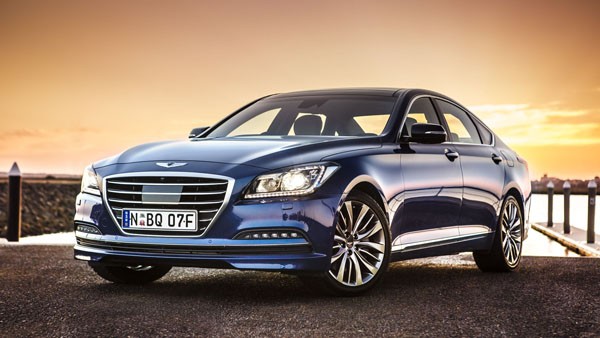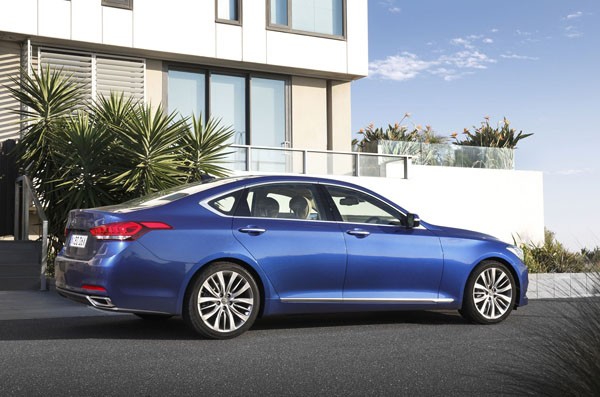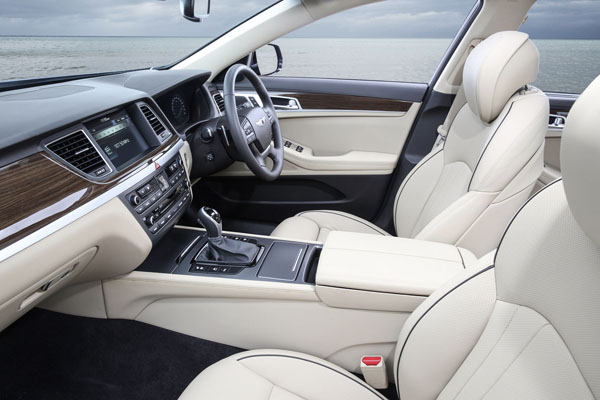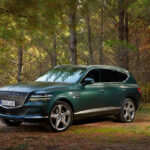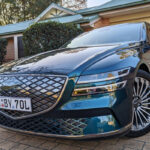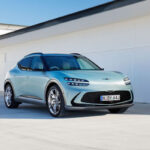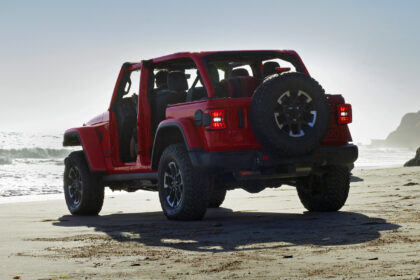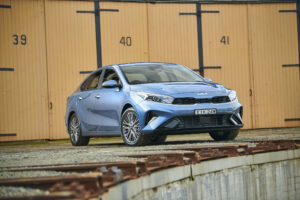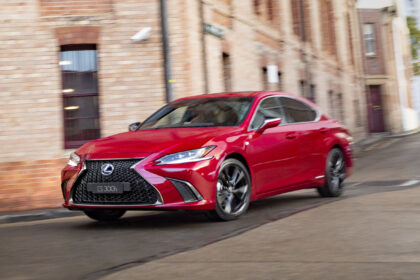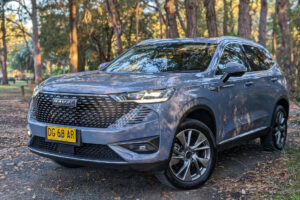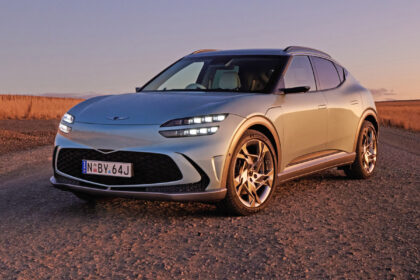Hyundai Genesis is an upmarket, high-tech sedan/saloon designed to tackle the big-name Germans and Brits at their own game at the top end of the market.
This is a large car; bigger than the Holden Commodore and Ford Falcon. It’s also a little larger than the cars with which Hyundai would like to compete head on; Mercedes-Benz E-Class, BMW 5 Series, Audi A6 and Jaguar XF.
The new Hyundai Genesis is priced from $60,000 making it a bargain in its class. Interestingly, the Genesis may benefit from the withdrawal of Ford and Holden from manufacturing in Australia. Limousine companies, taxi operators, corporate owners, even government fleets, are all on the lookout for large cars to replace Caprice, Statesman, Commodore, LTD, Fairlane and Falcon.
STYLING
Genesis is not as out-there in its shape as the smaller Hyundai models. As it’s aimed at more conservative buyers with substantially more money than the owners of the rest of the Kia range, this is probably a sensible move. The shape is graceful and very much in the European vein – which is interesting as one of the senior designers was a Korean-Australian fellow.
The Hyundai has a large single-frame grille of the type favoured by Audi and Mercedes, though BMW has taken a different direction, as has Jaguar.
The side profile is curved and almost in four-door coupe territory. There’s a fashionable rise in the window line at the side-rear. Tail treatment has a built-in spoiler lip and the wide stance gives Genesis a powerful look from the rear. There’s no doubt this is a large car.
The interior of the Genesis is excellent, with a modern appearance using multiple materials, including an upmarket hand-stitched look, real timber, suede and aluminium.
Like just about every prestige car these days, Hyundai Genesis has an analog-look clock sitting in the centre of the dashboard. However, it’s rather small and doesn’t exactly grab attention the way competitors’ do.
ENGINE / TRANSMISSION
Only one engine is offered in the Australian Genesis; though the gen-two model now has its steering wheel on the Australian side, only those buyers who drive on the ‘other’ side of the road have a V8 option. Our Genesis has a thoroughly modern 3.8-litre petrol V6 developing 235 kilowatts of power and 400 Nm of torque.
Transmission is by an eight-speed automatic to the rear wheels. Yes, the rear wheels, as in Mercedes, BMW and Jaguar, though not Audi.
INFOTAINMENT
The Hyundai Genesis is crammed with the latest in in-car entertainment, including a 17-speaker Lexicon audio system. Bluetooth, USB and Aux inputs are simple to use. The screen is a good size and easy to read.
SAFETY
There are numerous crash avoidance or minimisation features, including all-round electronic vision, automatic emergency braking, lane keeping, radar cruise control and a large, coloured head-up display. Not all items are sold in all models, contact your local dealer for details.
Hyundai Genesis has gained the highest score ever in Australian NCAP testing, an impressive feat given the huge amount of work being done in this field by the major European car makers.
The optional $11,000 Sensory Pack adds a range of driver assistance features including Blind Spot Detection, Rear Cross Traffic Alert, Lane Change Assist, Head-Up Display as well as premium leather interior and LED front foglights.
DRIVING
Hyundai’s big 3.8-litre V6 engine is rapidly becoming one of our favourite powerplants. It’s not only strong throughout the rev range, but also produces the near instant response to the throttle you just don’t get in even the best of turbocharged units. In normal driving the Genesis six is as smooth and luxurious as you want from a large car, but when pushed along hard it provides the sorts of sounds keen drivers love.
While not exactly a gas guzzler it uses 11 to 13 litres per hundred kilometres in suburban day-to-day running and quickly climbs into the mid teens if you really have a go. Freeway and open road driving can bring it way down, into the high sevens, a factor of the tall gearing in the eight-speed automatic transmission.
Many buyers in this class put comfort ahead of dynamic handling and steering. However, the importer understands that Australian drivers like more feel and feedback than their Asian and American cousins so have modified the suspension, giving it a slightly firmer.
Road grip is plentiful and the car is nicely balanced; even better, the Genesis can be cornered on the throttle in true rear-drive fashion if you’re feeling that way inclined. At over two tonnes with just one person on board it can hardly be described as nimble.
Seat comfort in the front is very good, with side support that works nicely without the seat bolsters being too aggressive. Fair enough, the Genesis isn’t intended to be a sports sedan.
Despite the apparently sleek roofline there’s good headroom in the rear of this big saloon. Legroom in the back is good without being outstanding if tall adults are travelling in the front, but powering the front seats forward brings the Genesis into the semi-limo class. Three can be carried in the back but, as in rear-drive cars footroom in the centre-rear seat is compromised by the transmission tunnel.
The rear-centre armrest folds down to provide not only extra comfort, but also to give access to controls for the infotainment and ventilation systems. As is common in large Asian cars the front passenger seat can be controlled by way of controls in the rear seats. This lets the most important person in a limo, the man (sadly, it almost invariably is a man) sitting diagonally behind the driver, the ability to maximise their knee and foot room
Noise and vibration are reduced to impressively low levels. Hyundai Genesis makes an excellent long distance tourer, even on rough and ready Australian bush roads.
Overnight wet weather caused serious brake grab on the first couple of stops in the morning no matter how gentle I was with the pedal. On the second morning I had to resort to riding the brakes against the accelerator to dry the discs. After that everything was fine for the rest of the day.
SUMMING UP
In terms of value for money this big South Korean machine makes the Germans and British cars look seriously overpriced. But what price a prestigious badge? Badge snobbery is alive and well in Australia, even more so than in many other countries. We look forward with interest to see what happens to a car obviously named with the intention of creating a new beginning.
AT A GLANCE
MODEL RANGE
Genesis 3.8-litre petrol four-door sedan: $60,000 (automatic)
Genesis (with Sensory Pack) 3.8-litre petrol four-door sedan: $71,000 (automatic)
Genesis (with Ultimate Pack) 3.8-litre petrol four-door sedan: $82,000 (automatic)
Note: These prices do not include government or dealer delivery charges. Contact your local Hyundai dealer for drive-away prices.
FEATURES
ABS Brakes: Standard
Automatic Transmission: Standard
Cruise Control: Standard
Dual Front Airbags: Standard
Front Side Airbags: Standard
Electronic Stability Program: Standard
Rear Parking Sensors: Standard
Reversing Camera: Standard in Elite
USB/Auxiliary Audio Inputs: Standard
Bluetooth: Standard
Steering Wheel Mounted Controls: Standard
SPECIFICATIONS (Hyundai Genesis 3.8-litre petrol four-door sedan)
ENGINE:
Capacity: 3.778 litres
Configuration: V6
Head Design: DOHC, four valves per cylinder
Compression Ratio: 11.5:1
Bore/Stroke: 96.0 mm x 87.0 mm
Maximum Power: 232 kW @ 6000 rpm
Maximum Torque: 397 Nm @ 5000 rpm
DRIVELINE:
Driven Wheels: Rear
Manual Transmission: Not offered
Automatic Transmission: Eight-speed
Final Drive Ratio: 3.909:1
DIMENSIONS, WEIGHT AND CAPACITIES:
Length: 4990 mm
Wheelbase: 3010 mm
Width: 1890 mm
Height: 1480 mm
Turning Circle: 11.1 metres
Kerb Mass: 1890-1995 kg
Fuel Tank Capacity: 77 litres
Towing Ability: Not supplied
Boot Capacity: 433 litres
SUSPENSION AND BRAKES:
Front Suspension: Multi-link
Rear Suspension: Multi-link
Front Brakes: Ventilated disc
Rear Brakes: Disc
FUEL CONSUMPTION:
Type: Petrol 91RON
Combined Cycle (ADR 81/02): 11.2 L/100km
GREEN VEHICLE GUIDE RATINGS:
Greenhouse Rating: 4.5/10
Air Pollution Rating: 7.5/10
STANDARD WARRANTY:
Five years/unlimited km




